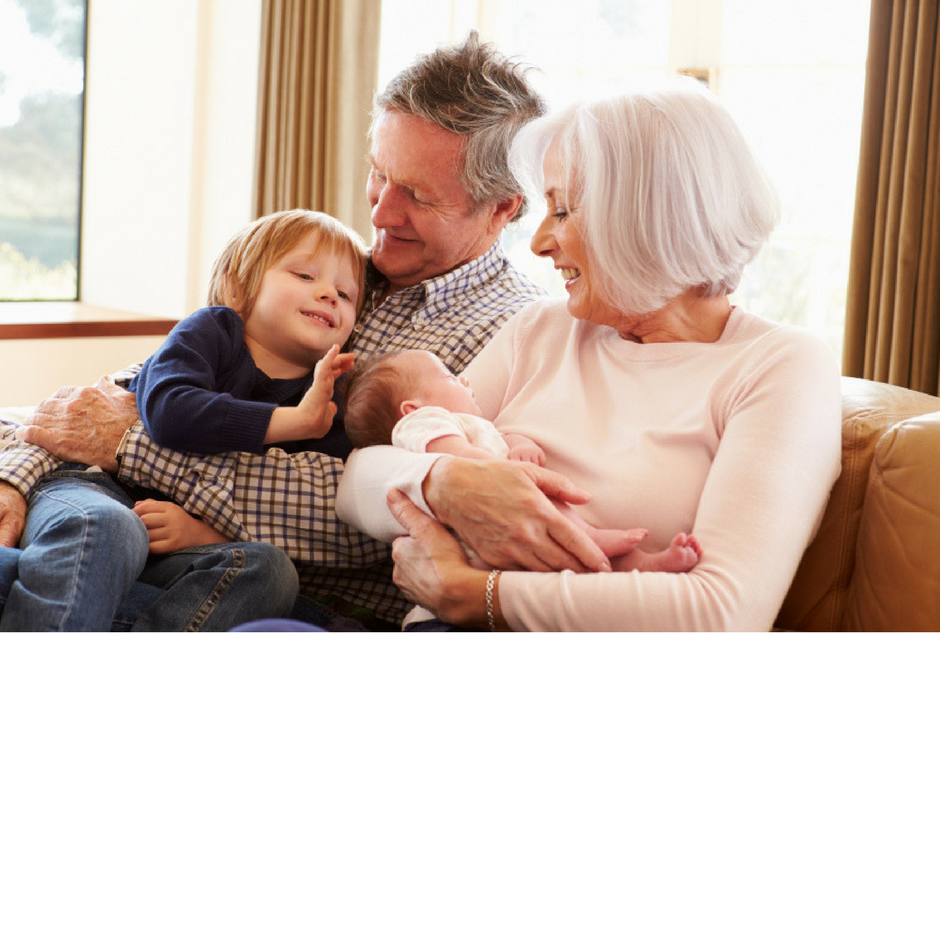New parents are often exhausted, vulnerable, and desperate for practical and emotional support. They can hold expectations of their families based on assumptions they haven’t verbalised. As a result, new parents can feel disappointed when these expectations are not met.
Similarly, when a baby is born, new grandparents can hold their own ideas about their grandparenting roles and about the involvement they wish to have in the lives of their children’s offspring. Some grandparents can feel shut out of their grandchildren’s lives, and others can feel overly responsible to be available at all times. What about when there are no grandparents? Although family dynamics can be complicated, some new parents have no family support and can feel alone and isolated. For these families, the charity organisation, Caring Mums, trains older mums who volunteer their time to make weekly visits to families needing practical and emotional support. As part of their training, these volunteers learn to withhold their opinions, and to focus on fostering confidence in new parents, by supporting them to find their own way with their babies. I was invited by Caring Mums to give a fundraising talk, entitled “Grandparenting in the 21st Century”. Drawing from 15 years as a perinatal (pregnancy and postnatal) psychologist, I had heard many stories about the ways in which grandparents become involved in families’ lives – in some cases providing invaluable support and fostering beautiful relationships with their grandchildren, and in other cases being uninvolved or even undermining the parents’ wishes. Needless to say, I had much to draw upon. However, prior to the talk, I decided to do a little additional research. I posted a question on a mother-baby social media site asking mums to share their experiences regarding the “Dos and Don’ts” of grandparenting - "...what helps and what hinders?". Many mums responded, both publicly and privately. I collated their responses and shared this list with the grandparents who attended the talk. • Call before coming over • Only give advice when asked • Ask what support is needed • Just help, don’t offer • Help with practical tasks such as cooking, shopping, washing • Never do our washing • When visiting, bring a meal • Just do what needs to be done • Ask before you do things around the house • Don’t take the baby unless asked to. Let the new parents learn about their baby and develop good bonds • When you come over, offer to take baby and let Mum shower • Turn visitors away in the first 3 weeks • If you had a similar problem, tell the parents what you did, not what they should do • Get your vaccines done • Give predictable times when helping with grandchildren • Don’t compete with the other grandparents • Remember things have changed since you had children • Don’t say “we survived without….”, “we never did…..” • Don’t stay all day or expect to be waited on • Don’t force children to kiss/hug you • Babysitting is a privilege not a right • Listen without trying to solve problems • Don’t criticize without giving a solution • Don’t criticize! • When we do things differently to you, don’t take it as a personal criticism • Don’t judge a messy house • Don’t talk about mum’s pregnancy or post-baby weight • Don’t say “my baby” • Stick to the same rules as the parents • Don’t undermine the parents’ rules • Don’t give junk food to children if parents have asked you not to • Don’t say to the child “I’ll get into trouble if I give you that” • Do special things with the grandchildren • Tell the parents they are doing a good job Two things struck me 1. There were obvious differences among mums about what constitutes support. Largely, the differences around asking about what can be done versus just doing it. Differences were evident between mums regarding the things they feel comfortable about grandparents doing for them. What is helpful and non-judgemental to one woman can be considered to be intrusive and laden with judgement to another. 2. When I shared the list of “Dos and Don’ts” to the grandparents who attended the talk, it was met with a resounding applause. The grandparents in the group agreed wholeheartedly with these requests. I was surprised. I was expecting to be met with some defensive responses about grandparents feeling used or misunderstood. But this was not the case. These grandparents agreed that the requests were reasonable. Now it could be argued that the grandparents who chose to attend this talk were a group who had put a lot of thought into their grandparenting roles already - a group who had considered carefully how to best support their offspring and grandchildren. A group interested in doing the best they could as grandparents, hence their attendance at a talk such as this. What I discovered Notwithstanding that I may have struck a particularly supportive group of grandparents, a number of things became evident from my informal research across both groups:
Take home messages There is an intrinsic complexity in these relationships, given the shared histories (joys and hurts) between grandparents and their children (the new parents). But what can we learn from what parents and grandparents told me? 1. Don’t assume As was evident in the list, what is helpful for one person might not be helpful for another. Everyone is different. Similarly for grandparents, the role and the extent to which grandparents want to be involved differs from one grandparent to the next. It is not helpful for either party to assume that they know what the other is thinking, expecting or wanting. 2 Communicate It is vital to talk to one another. When grandparents ask the new parents what they can do to help, this communicates not only a willingness to offer practical support, but it allows grandparents to tune in to their adult children’s needs and to really be there for them at this challenging time. It is ok for grandparents to express their desires to help as well as their conflicts around not wanting to interfere. This may be better for new parents to know as opposed to grandparents holding back, leaving new parents to make assumptions (e.g. “they don’t care”). Similarly, it is ok for grandparents to put limits on their time. In fact, many new parents have told me that they appreciate knowing what the grandparents feel is a reasonable amount of time spent with the grandchildren. Many new parents appreciate a predictable commitment of time so they can schedule breaks or time to get things done. And this can give grandparents precious time alone with their grandchildren. Parents crave respect for their parenting choices, particularly when parenting opinions and judgements are rife in their everyday lives. They may ask for the grandparents’ opinions and they may not. This is their time to discover what works and what doesn’t. Remember, parents want to do what they believe is best for their child. Summary Sleep-deprived new parents can feel sensitive to well-intentioned comments or perceived judgements by grandparents. Many new parents grapple with defining the kinds of parents they want to be to their child. Their values come in part from what worked and what didn’t work for them in their childhoods. As this unfolds, closeness, differences, unresolved issues and stress can be triggered between new parents and grandparents. Parents, tell grandparents what is helpful. More often than not they are wanting to do what helps, but they get can get it wrong when their actions are based on assumptions. Show them that you appreciate their efforts. Encourage them to forge special relationships with their grandchildren. Let them have some autonomy in their grandparenting without compromising the things that are really important to you. When you are not happy with something they are doing or not doing, express it in a calm, respectful way. Parents, remember that grandparents have done their hard yards in parenting and working. Check in on how involved they want to be with the grandchildren. Respect this time in their lives by asking for help, not expecting it, and by showing your appreciation when you receive it. Indeed it could be argued that grandparents' care of your children is a “privilege not a right” - your privilege. Grandparents, remember that parents won’t get it all right (they are human, just like you). They will be stretched physically and emotionally as parents. They need to know that you are there, and that you care. If they want your advice, let them ask for it. If you want to give advice, ask them if they would like to hear it. Conclusion Parenting and grandparenting are profound roles that shape families and leave enduring memories in children’s lives. Consider how you would like your children and grandchildren to remember family life. Share these goals with one another, express yourselves respectfully, show gratitude, and look after one another. Written by Dr Renée Miller (Perinatal Clinical Psychologist) Founder of the Antenatal & Postnatal Psychology Network Thank you to the mums who generously shared their experiences on Babies Toddlers Kids Melbourne. Thank you to the grandparents who attended the fundraising talk for Caring Mums, who shared their compassion and wisdom. Further information about Caring Mums and donations to this important charity can be made here. Comments are closed.
|
AuthorPosted by Dr Renée Miller Topics
All
|
|
We acknowledge and pay respects to the Elders and Traditional Owners of the land on which our psychologists practise.


 RSS Feed
RSS Feed

